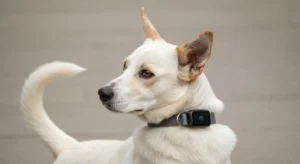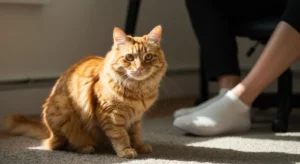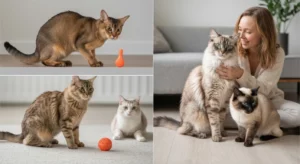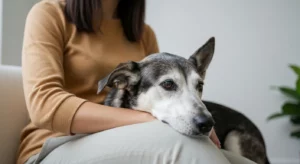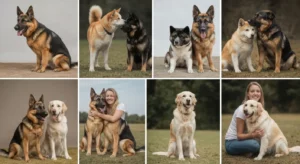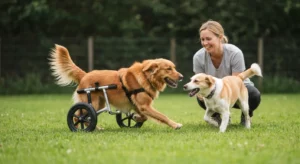My apartment used to be a fortress of solitude, but not in a cool, superhero kind of way. It was a monument to order, control, and a quiet, gnawing loneliness I refused to acknowledge. Every throw pillow was karate-chopped into submission, every book on my shelf was arranged by color and genre, and the silence was a tangible thing, broken only by the hum of the refrigerator and the distant wail of a city siren. I told myself this was sophisticated adult living. In reality, it was a life lived in grayscale.
I worked long hours as a graphic designer, pouring my creativity into pixels and palettes, and came home to an empty space that echoed my own emotional vacancy. I’d always wanted a dog, a childhood dream that persisted into my thirties. But my rational mind, the same one that alphabetized my spice rack, always won the argument. My apartment is too small. My hours are too long. It’s not fair to the dog. The excuses were a shield, protecting me from a responsibility I feared I couldn’t handle and a love I feared I didn’t deserve.
Then came the email from my friend, Jenna, who volunteered at a local animal rescue. It was a plea, one of dozens she sent out each week. “Emergency Foster Needed,” the subject line screamed. The body of the email contained a blurry photo of a dog. He was a scruffy, caramel-colored terrier mix with ears that couldn’t decide if they wanted to stand up or flop down. His name was Barnaby.
“He just needs a place to decompress for two weeks,” Jenna’s text message followed up. “He’s terrified at the shelter and is getting shut down. We have a transport arranged to a partner rescue up north where he’ll have a better chance, but we need a quiet home for him until then. Just fourteen days, Kate. That’s it.”
Fourteen days. It felt manageable. A temporary disruption. It was a good deed, a way to dip my toe into the world of dog ownership without the lifelong commitment. It was a project with a clear beginning and a definite end. I could do that. “Okay,” I typed back, my heart thumping with a mixture of terror and a strange, unfamiliar flicker of excitement. “I’ll do it.”
The Trembling Shadow in My Hallway
Two days later, Jenna stood at my door with a shaking, whimpering creature on a frayed blue leash. The blurry photo hadn’t done justice to the sheer terror in his eyes. Barnaby was smaller than I expected, all ribs and elbows, and his scruffy coat was matted in places. He smelled of fear and concrete. He refused to cross the threshold of my apartment, planting his paws firmly on the welcome mat as if it were the edge of a cliff.
Jenna and I had to gently coax him inside. The moment the leash was unclipped, he bolted, not with a playful energy, but with a desperate scramble for safety. He found it in the darkest, most inaccessible corner of my living room: the narrow gap between the back of my sofa and the wall. And there he stayed, a trembling, silent lump of fur.
The first 24 hours were a study in failure. My pristine apartment suddenly felt like a minefield. I set out a bowl of expensive, grain-free food and fresh water. He ignored them. I tried to lure him out with a squeaky toy. He flinched at the sound. That night, the silence of my home was different. It wasn’t empty anymore; it was tense, filled with the unspoken presence of a traumatized little soul hiding in the shadows.
I slept on the couch, telling myself it was in case he needed to go out, but really, I couldn’t bear the thought of him being alone in the living room. Sometime around 3 a.m., I heard a faint scratching and the lap, lap, lap of a tongue against water. It was the most beautiful sound I had ever heard.
Learning a New Language
Those first few days dismantled every preconceived notion I had about dogs. There were no happy greetings at the door, no slobbery kisses, no games of fetch. My life with Barnaby was a slow, quiet negotiation built on patience I didn’t know I possessed.
I learned to speak his language. It was a language of stillness, of averted gazes, of small, non-threatening offerings. I would sit on the floor on the other side of the room, reading a book aloud in a calm, steady voice just so he could get used to my sound. I learned that he wouldn’t eat from his bowl, but if I scattered a few pieces of kibble on the floor near his hiding spot, they would eventually disappear when he thought I wasn’t looking.
Our walks were clandestine operations, conducted at 5 a.m. and 11 p.m. when the city streets were hushed. He was terrified of everything: the rumble of a garbage truck, the laughter of people passing by, the flapping of a plastic bag caught in the wind. Each walk was a tightrope act of managing his fear, my hand gripping the leash until my knuckles were white.
The breakthrough, when it came, was so small it was almost imperceptible. It was day four. I was sitting on the floor, exhausted and discouraged, eating a piece of grilled chicken for dinner. I tore off a tiny, unseasoned piece and placed it on the floor about five feet away from me. I didn’t look at him. I just kept eating. Out of the corner of my eye, I saw a hesitant nose poke out from behind the sofa. He took one tentative step, then another. With the delicacy of a bomb disposal expert, he snatched the chicken and retreated back into his cave.
My breath caught in my throat. I had never felt such a profound sense of accomplishment. It wasn’t about him obeying me; it was about him trusting me. Just for a second. It was everything.
The Unraveling of a Foster Plan
From that day forward, the invisible wall between us began to crumble, brick by tiny brick. He started emerging from behind the sofa for longer periods. He would lie on the rug while I worked, his head on his paws, watching me with his soulful, intelligent eyes. One evening, as I was watching a movie, I felt a gentle weight on the cushion next to me. He had jumped onto the couch, curled into a tight ball at the far end, and promptly fallen asleep. His soft snores filled the silence that had once felt so oppressive.
My sterile apartment started to look… lived in. A half-chewed rubber bone lay by the coffee table. A water bowl sat permanently by the kitchen door. A fine layer of caramel-colored fur began to settle on everything I owned, and I found I didn’t mind. I was writing a happy pet story in real-time, and my perfectly ordered world was becoming beautifully, wonderfully messy.
I started calling him “Barnaby-Boo” and “Mr. Scruffles.” I discovered his quirks: the way he’d let out a dramatic, old-man sigh before settling down for a nap; his obsession with chasing reflections from my watch; the way one ear would stand straight up when he heard the crinkle of a treat bag.
The fourteen days came and went. I emailed Jenna. “He’s still really shy. I think he needs another week or two.” It was a lie, and we both knew it. He was blossoming. But the thought of him leaving, of packing him into a crate for a long, scary journey to another unknown place, felt physically painful.
The real turning point came on a Tuesday night, the end of week three. I’d had a brutal day at work, and I came home feeling defeated and small. I dropped my keys on the counter and slumped onto the sofa, burying my face in my hands. The stress of the day washed over me, and a single tear escaped and rolled down my cheek.
I felt a wet nose nudge my elbow. I looked up. Barnaby had moved from his end of the couch and was sitting right beside me. He looked at me, tilted his head, and then did something he had never done before. He leaned his entire body against mine and rested his scruffy head on my lap. He looked up at me with eyes that weren’t full of fear anymore, but of a deep, unwavering knowing. In that single, simple gesture, he was telling me, I see you. It’s okay. I’m here.
My Forever Friend
That was it. That was the moment the charade of “fostering” fell away, revealing the truth that had been growing in my heart for weeks. He wasn’t just a dog I was temporarily housing. He was my dog. He had rescued me just as much, if not more, than I had rescued him.
The next morning, I picked up my phone. My hand was steady. I didn’t feel fear or uncertainty, only a profound sense of rightness.
“Jenna?” I said when she answered. “It’s Kate.”
“Hey! Just about to call you. Transport is confirmed for this Saturday.”
I took a deep breath. “About that… you can cancel it. He’s not going.”
There was a pause on the other end of the line, followed by a soft, knowing laugh. “Oh, Kate. I knew it from day one. Welcome to the club.”
I hung up the phone and looked down at Barnaby, who was now asleep on my feet, his paws twitching as he dreamed. I was officially a “foster fail,” and it was the most successful failure of my entire life. The paperwork was a formality. In our hearts, we had already signed the adoption papers that night on the couch.
Today, my apartment is no longer a silent fortress. It’s a home, filled with the click-clack of paws on hardwood floors, the happy jingle of a collar, and the soft snores of a dog who sleeps soundly on my bed every night. Barnaby is no longer the trembling shadow in the hallway. He’s a confident, goofy, endlessly loving companion who greets me at the door with a full-body wiggle and a toy in his mouth. He taught me that a home isn’t about perfect pillows or organized shelves. It’s about love, chaos, and the incredible, life-altering bond you can share with an animal who needed you as much as you needed them.
He wasn’t a temporary project. He was my forever friend, waiting in the wings to fill a space in my heart I never even knew was empty. And for that, I will be forever grateful.




